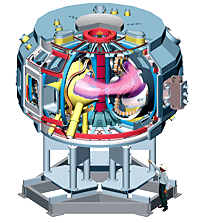 According to Science magazine, "this week, DOE terminated the National Compact Stellarator Experiment (NCSX) at the Princeton Plasma Physics Laboratory (PPPL) in New Jersey. The not-yet-completed reactor would have been one of four large "magnetic confinement" reactors in the United States.......Had it been completed, the NCSX might have served as the prototype for the next great fusion experiment to come after ITER, the $12 billion machine that will be built in Cadarache, France..... The cancellation of the NCSX strikes a body blow to the United States's domestic fusion program.......The cut intensifies the uncertainty already facing plasma physicists. Over the past decade, DOE's budget for fusion research has stagnated at $300 million, and since the United States rejoined the ITER collaboration in 2003, researchers have fretted that money for smaller experiments at home might be siphoned off to pay for the nation's commitment overseas. (This year, however, the U.S. Congress zeroed out a scheduled $149 million contribution to ITER and bumped up the budget for running domestic facilities to $93.5 million, $6 million more than DOE had requested.)"
According to Science magazine, "this week, DOE terminated the National Compact Stellarator Experiment (NCSX) at the Princeton Plasma Physics Laboratory (PPPL) in New Jersey. The not-yet-completed reactor would have been one of four large "magnetic confinement" reactors in the United States.......Had it been completed, the NCSX might have served as the prototype for the next great fusion experiment to come after ITER, the $12 billion machine that will be built in Cadarache, France..... The cancellation of the NCSX strikes a body blow to the United States's domestic fusion program.......The cut intensifies the uncertainty already facing plasma physicists. Over the past decade, DOE's budget for fusion research has stagnated at $300 million, and since the United States rejoined the ITER collaboration in 2003, researchers have fretted that money for smaller experiments at home might be siphoned off to pay for the nation's commitment overseas. (This year, however, the U.S. Congress zeroed out a scheduled $149 million contribution to ITER and bumped up the budget for running domestic facilities to $93.5 million, $6 million more than DOE had requested.)"I would think even the White House and the Congress should be aware by now that there is a long term energy problem, and that research on new sources of energy should be given high priority. Fusion energy offers immense potential over the long term. Not only does fusion generate huge amounts of energy per unit weight, there is a huge amount of heavy hydrogen around (the heavy isotopes of hydrogen are used to fuel the fusion reaction). Moreover fusion generation of electrical power would be expected to be relatively environmentally benign since it should not generate nuclear waste as do the fission reactors.
Currently the generation of electrical power from fossil fuel is the major source of greenhouse gases. Electification drove economic growth in developed nations in the industrial age, and can be expected to drive industrial development in the developing world in this century. If coal and oil plants are used to generate the needed electricity, global warming will be a huge problem, one that could be reduced by a timely development of fusion fueled electrical generation.
Moreover, we could move to a hydrogen economy with abundant electrical power fueled by fusion, substituting electrical power and/or hydrogen chemical power in our transportation system for fossil fuels, making transportation possible without greenhouse gas emissions.
With abundant electrical power, we could also overcome the coming shortage of fresh water, pumping water to where it is needed, and desalting as much sea water as might be required to complement the available fresh water resources.
The countries that gain a competitive advantage in the technology for fusion will eventually be expected not only to benefit from the domestic application of the technology to meet domestic needs, but also to gain an important advantage in the global market for energy systems.
Cutting back on fusion energy research funding seems really bone-headed. Of course, it is being done as a response to the huge bill for the war in Iraq and the coming economic crisis. Still, there must be better places to make the needed cuts in the federal budget.
No comments:
Post a Comment